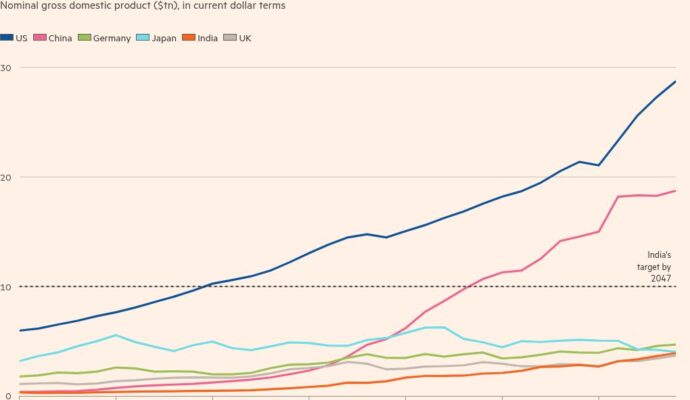Unlock the Editor’s Digest for free
Roula Khalaf, Editor of the FT, selects her favourite stories in this weekly newsletter.
Indonesia’s stock market has racked up losses as political tensions remained high even after President Prabowo Subianto scrapped lavish allowances for lawmakers that sparked week-long protests across the country.
South-east Asia’s largest economy has been rocked by civil unrest that was initially triggered by new housing allowances of $3,000 for parliamentarians. Protesters’ grievances include economic inequality, a lack of jobs and police brutality.
Indonesia’s benchmark stock index fell as much as 3.6 per cent on Monday before paring losses to trade 1.1 per cent lower.
The rupiah edged up 0.3 per cent against the dollar to Rp16,430 while yields on the country’s 10-year government bonds climbed 0.05 percentage points to 6.39 per cent. The central bank said it would defend the national currency to ensure “exchange rate stability and adequate rupiah liquidity”.
“Stability is being provided by the central bank,” said Jason Pang, a senior portfolio manager at JPMorgan Asset Management. “There’s a degree of sell-off but it’s well contained in the near term.”
Wee Khoon Chong, senior strategist at BNY, said: “With all this uncertainty, people are just reducing risk.”
Public anger was fuelled by the death of a 21-year-old motorbike taxi driver after he was hit by a speeding police vehicle at the site of one of the protests in central Jakarta. At least eight people have been killed in the unrest, according to economic affairs minister Airlangga Hartarto.
Over the weekend, mobs broke into and looted the homes of finance minister Sri Mulyani Indrawati and several lawmakers.
Rully Arya Wisnubroto, senior economist at Mirae Asset Sekuritas Indonesia, said last week’s political instability was “the worst since the riots in 1998”, when prolonged demonstrations led to the end of the three-decade rule of dictator Suharto.
“We expect market uncertainty to remain very high in the foreseeable future, with sentiment likely to be heavily influenced by the recovery of political and security conditions, as well as the resumption of economic activity in cities affected by the riots,” he said.
No major protests were held on Sunday evening as military and police patrols in Jakarta increased after Prabowo’s call for strict action against what he called “anarchic acts”.
“Aspirations can be delivered peacefully,” Prabowo said at a news briefing on Sunday. “However, if the implementation involves anarchic actions, destabilisation of the state, destruction and burning of public facilities, resulting in fatalities, threats and looting of homes . . . then this constitutes a violation of the law.”
Still, some groups have called for rallies this week. Several companies across the country have asked their employees to work from home while some schools have been closed.
“Tensions could still stay elevated in the week(s) ahead,” Citi economist Helmi Arman said in a research report on Monday. The rise in the domestic political temperature increases uncertainty over growth while cabinet changes could not be ruled out, he added.
BNY’s Chong noted that Indonesian bond and currency markets had remained relatively stable, as investors watched how the government would respond to the unrest.
“An unhinged sell-off is not happening,” he said. “As soon as we have positive developments from the government I think the market will stabilise.”
Additional reporting by William Sandlund in Hong Kong


